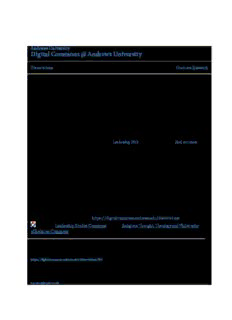
Perceptions of Seventh-day Adventist Church Elders in Ghana and the United States on Servant PDF
Preview Perceptions of Seventh-day Adventist Church Elders in Ghana and the United States on Servant
Andrews University Digital Commons @ Andrews University Dissertations Graduate Research 2014 Perceptions of Seventh-day Adventist Church Elders in Ghana and the United States on Servant Leadership and Culture: a Correlational Study Appiah Kubi Kwarteng Andrews University This research is a product of the graduate program inLeadership PhDat Andrews University.Find out more about the program. Follow this and additional works at:https://digitalcommons.andrews.edu/dissertations Part of theLeadership Studies Commons, and theReligious Thought, Theology and Philosophy of Religion Commons Recommended Citation Kwarteng, Appiah Kubi, "Perceptions of Seventh-day Adventist Church Elders in Ghana and the United States on Servant Leadership and Culture: a Correlational Study" (2014).Dissertations. 504. https://digitalcommons.andrews.edu/dissertations/504 This Dissertation is brought to you for free and open access by the Graduate Research at Digital Commons @ Andrews University. It has been accepted for inclusion in Dissertations by an authorized administrator of Digital Commons @ Andrews University. For more information, please contact [email protected]. Thank you for your interest in the Andrews University Digital Library of Dissertations and Theses . Please honor the copyright of this document by not duplicating or distributing additional copies in any form without the author’s express written permission. Thanks for your cooperation. ABSTRACT PERCEPTIONS OF SEVENTH-DAY ADVENTIST CHURCH ELDERS IN GHANA AND THE UNITED STATES ON SERVANT LEADERSHIP AND CULTURE: A CORRELATIONAL STUDY by Appiah Kubi Kwarteng Chair: Erich Baumgartner ABSTRACT OF GRADUATE STUDENT RESEARCH Dissertation Andrews University School of Education Title: PERCEPTIONS OF SEVENTH-DAY ADVENTIST CHURCH ELDERS IN GHANA AND THE UNITED STATES ON SERVANT LEADERSHIP AND CULTURE: A CORRELATIONAL STUDY Name of researcher: Appiah Kubi Kwarteng Name and degree of faculty chair: Erich Baumgartner, Ph.D. Date completed: July 2014 Problem Servant leadership has been discussed and described mostly in the North American context. Thus, there are concerns that this model of leadership may be culturally anchored in North American metaphors and thinking and may have limited universal applicability outside that context. In recent times, the Seventh-day Adventist Church has seen its membership swell mainly in non-Western areas such as Sub-Saharan Africa. With the changes taking place in the church membership globally, and the challenges these changes impose on leadership, this study was pursued with a twofold purpose. One was to investigate the differences in the perceptions of elders of the Seventh-day Adventist Church in Ghana and the U.S. on four servant leadership attributes (Agapao Love, Empowerment, Vision, and Humility). The second was to investigate their on the relationship between servant leadership and three cultural dimensions (Power Distance, Gender Egalitarianism, and In-Group Collectivism). Method A quantitative research design was used to survey the elders of the Seventh-day Adventist Church in two selected union conferences in two different countries, Ghana and the United States of America (USA). The Servant Leadership Assessment Instrument (SLAI), prepared by Dennis (2004) three cultural variables incorporated from the GLOBE Research Study (2004), served as part of the survey instrument for the collection of data on servant leadership and cultural attributes. In addition, a one-page, nine-item instrument was used to collect demographic information. These surveys were sent to 3,000 randomly selected Seventh-day Adventist church elders which resulted in responses from 1,284 elders of the Seventh-day Adventist Church in Ghana and U.S., 831 and 417 respectively. Hoteling’s T2 or two-group between subjects multivariate analysis of variance (MANOVA) was used to analyze the differences in perception of servant leadership. Canonical correlation was used to analyze the relationships between servant leadership and culture. Conclusions and Recommendations The findings revealed statistically significant differences in the perceptions of elders of the Seventh-day Adventist Church in Ghana and the U.S. regarding the servant leadership attributes of Agapao Love, Empowerment, Vision, and Humility. Elders in U.S. reported experiencing servant leadership behaviors significantly more than did their Ghanaian counterparts. Secondly, there were statistically significant relationships between the perceptions of elders of the Seventh-day Adventist Church in Ghana and U.S. regarding the servant leadership attributes of Agapao Love, Empowerment, Vision, Humility and cultural dimensions of Power Distance, Gender Egalitarianism, and In-Group Collectivism. The elders in both countries reported moderate relationships between servant leadership and the cultural dimensions. In Ghana, the relationships were high between Gender Egalitarianism and Empowerment, while in the U.S., they were high between In-Group Collectivism and Vision. Because the Seventh-day Adventist Church currently operates in 203 countries where cultures influencing the expectations about the process of leadership differ widely, it is imperative that it takes time to examine the qualities that characterize servant leadership, to assess current practices, to identify gaps, and to provide training to make up the difference. Andrews University School of Education PERCEPTIONS OF SEVENTH-DAY ADVENTIST CHURCH ELDERS IN GHANA AND THE UNITED STATES ON SERVANT LEADERSHIP AND CULTURE: A CORRELATIONAL STUDY A Dissertation Presented in Partial Fulfillment of the Requirements for the Degree Doctor of Philosophy by Appiah Kubi Kwarteng July 2014 © Copyright by Appiah Kubi Kwarteng 2014 All Rights Reserved PERCEPTIONS OF SEVENTH-DAY ADVENTIST CHURCH ELDERS IN GHANA AND THE UNITED STATES ON SERVANT LEADERSHIP AND CULTURE A dissertation presented in partial fulfillment of the requirements for the degree Doctor of Philosophy by Appiah Kubi Kwarteng APPROVAL BY THE COMMITTEE: ________________________________ _____________________________ Chair: Erich Baumgartner Dean, School of Education James R. Jeffery ________________________________ Member: Tevni Grajales ________________________________ Member: Duane Covrig ________________________________ _____________________________ External: Lester Merklin Date approved Dedicated to my family and particularly in honor of my beloved wife, Grace Kwarteng, my children, Jemimah and Samuel, my brother, Joseph Kwarteng, my late father, Agya Yaw Kwarteng, and my late mother, Godogodo Grace Adade. iii
Description: